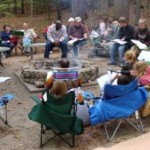The Body Metaphor in Paul: Familiar and yet unique
Like I’ve mentioned in my last few posts, I’ve been re-reading one of my favorite academic books on the church: Paul’s Idea of Community by Robert Banks (Peabody: Hendrickson, 2004). So far, I’ve discussed Banks’ examination of Paul’s idea of salvation as freedom (“For Paul, freedom means independence, dependence, and interdependence“), Paul’s use the term ekklesia to refer to groups of believers who actually gather together (“The ekklesia that actually gathers in a location“), and Paul’s use of the term ekklesia to refer to our heavenly reality of being raised and seated together with God in Christ (“The ekklesia as a heavenly reality“). (By the way, this will be my last post on this book for now. Although, this topic has inspired me to study the “body” metaphor in Paul’s writings. That study will probably result in a series of blog posts, perhaps to be published next week.)
In the next couple of chapters, Banks looks at Paul’s use of family language and his use of the “body” metaphor. For each of those, he found some vague parallels in other religions and philosophical societies. However, in each case, Paul’s use of the language and metaphors was different from what he found in other writings and communities.
For example, consider this summary about Paul’s use of the “body” metaphor in relation to other religions and societies:
How original is Paul’s use of the “body” metaphor? It has no exact parallels in Jewish literature. Although the notion of “corporate personality” is present in the Hebrew Bible, it was the Greek translation of the OT that introduced the term “body” into Jewish thought for the first time (e.g., Lev 14:9; Prov 11:17). Yet neither here nor in the literature of the intertestimental period was the term used in any metaphorical way…
Gnostic thought recognizes the idea of the saved community as the body of the heavenly redeemer but only in writings that are later than the NT. In any case, Paul’s initial use of the metaphor, in which the community is represented by the whole body and the emphasis is upon the interdependence of its members, has no parallel in Gnostic sources.
In Stoic literature prior to the NT, we do find the cosmos (including humanity) depicted as the body of the divine world-soul and society as a body in which each member has a different part to play. But Paul refuses to portray the universe as Christ’s body and rejects any idea of a member’s wider society having priority over the Christian community. Individual and community are equally objects of his concern; neither is given priority over the other…
While none of these usages yields an exact parallel to [Paul’s] ideas, they do indicate the extent to which the metaphor was “in the air” in Hellenistic circles. While the term “body” did not originate with him, Paul was apparently the first to apply it to a community within the larger community of society and to the personal responsibilities of people for one another rather than their civic duties. We see again how a quite “secular” term is used by Paul to illuminate what Christian community is all about. (pp 65-66)
There is a great lesson for us in Banks’ comments. As we read ancient documents (and modern writings for that matter), we often find similar terms, phrases, metaphors, and illustrations. But, the fact that a person or community uses similar language does not mean that it is used in the same way. We must look at each usage in context to determine what the author intends to communicate.
While this is true in comparing Paul’s writings (and other NT writings) to nonChristian writings, we also must compare different usages of terms and phrases within Paul’s writings. Why? Because he could use the same terms, phrases, and especially the same metaphors for different reasons.
(By the way, this last statement is the reason that I’m planning to study Paul’s use of the “body” metaphor in each of his usages.)
The ekklesia as a heavenly reality
In my previous post (“The ekklesia that actually gathers in a location“), I explained that I’ve been re-reading one of my favorite academic books on the church: Paul’s Idea of Community by Robert Banks (Peabody: Hendrickson, 2004). Banks says that in Paul’s earlier letters (1-2 Thessalonians, Galatians, 1-2 Corinthians, and Romans), he only uses the term ekklesia to refer to groups of believers that actually gather together at some point.
However, when he turns to the letters to the Colossians and Ephesians, Banks finds an extension to Paul’s use of the term ekklesia. While he continues to use the term to refer to believers who actually gather together, he also uses the term to refer to “a heavenly reality.”
Banks says this concept is not new and that it can in fact be found in the earlier letters. However, it is not until the letters to the Colossians and Ephesians that Paul uses the term ekklesia to refer to this “heavenly reality.” But, Banks says it would be incorrect to equate this “heavenly reality” with the concepts of a “universal church” or an “invisible church.”
So in Colossians we are introduced to the idea of a nonlocal church of whom Christ is the head (Col 1:18,24). This notion is generally misinterpreted as a reference to the “universal church” that is scattered throughout the world. It is not an earthly phenomenon that is being talked about here, but a supernatural one. The whole passage in which the expression [ekklesia] occurs focuses on the victorious Christ and his kingdom of light that believers have now entered (1:9-2:7)…
If any hesitation remains about the possibility of understanding ekklesia as a heavenly assembly in Colossians, it is dispelled by the language used in Ephesians. There it is explicitly said that God “made us alive together with Christ… and raised us up with him, and made us sit with him in the heavenly places in Christ Jesus” (Eph 2:5-6 RSV)… Here again we see church taking place in heaven and Christians participating in it, even as they go about the ordinary tasks of life. Metaphorically speaking they are gathered around Christ, that is, they are enjoying fellowship with him. (pp 40-41)
So, according to Banks, Paul now has used the term ekklesia to refer to two different gatherings: 1) actual physical gatherings at certain times and certain places on earth and 2) heavenly gatherings in which all of God’s children are already raised and seated with God in Christ. The physical ekklesia, then, is a representation of the heavenly reality. And the fact that all believers were already gathered as a heavenly reality (not any kind of organization or structure) is the basis of expanding fellowship and relationships on earth:
These scattered Christian groups [churches] expressed their unity not by fashioning a corporate organization through which they could be federated with one another, but rather in a range of organized personal contacts between people who regarded themselves as members of the same Christian family.
So, Paul’s use of ekklesia as a “heavenly reality” should not be misunderstood as some type of umbrella organization. It is similar to the understanding that we are all part of the real family of God in Christ even though we may never meet each other in this physical reality on earth.
So, what do you think of Banks’ description of Paul’s reference to the ekklesia as a “heavenly reality.”?
The ekklesia that actually gathers in a location
Yesterday, I mentioned that I’ve been re-reading one of my favorite academic books on the church: Paul’s Idea of Community by Robert Banks (Peabody: Hendrickson, 2004). As you can imagine, Banks includes an extended discussion of Paul’s use of the Greek term ekklesia (usually translated “church” in English translations). In fact, two chapters focus on how Paul uses that term: “Church As Household Gathering” and “Church as Heavenly Reality.”
In the first chapter (“Church As Household Gathering”), he examines how Paul uses the term ekklesia in his earlier (chronologically) letters: 1-2 Thessalonians, Galatians, 1-2 Corinthians, and Romans. In these letters, Banks concludes that Paul only uses the term ekklesia to refer to groups of believers who actually gather together in a locality.
What is Paul’s early usage of the term ekklesia, church? He first uses the term in his greeting to the Christians in Thessalonica (1 Thess 1:1). Here he is using it in the same way as in Greek and Jewish circles and yet is consciously distinguishing the “assembly” to which he is writing from others in the city. It is clear from the closing remarks of the letter that Paul has in mind either an actual gathering of the Thessalonian Christians or the Thessalonian Christians as a regularly gathering community…
Elsewhere in these letters [1-2 Thessalonians] we have reference to other Christian gatherings only in the plural, viz., to “the churches of God” generally and to “the churches of God” in Judea specifically (2 Thess 1:4; 1 Thess 2:14). This suggests that the term is applied only to an actual gathering of people or to the group that gathers as a regularly constituted meeting and not, as today’s usage, to a number of local assemblies conceived as part of a larger unit. (pp 29-30)
Banks offers other evidence, such as Paul’s reference to the plural “churches in Galatia,” “churches of Asia,” and “the churches of Macedonia.” (Gal 1:2, 1 Cor 16:1, 1 Cor 16:19, 2 Cor 8:1) Similarly, he discusses Paul’s reference to “the whole church” in Corinth – indicating that the believers in Corinth did all gather together at some point, thus they could be referred to as “the church in Corinth,” and also indicating that believers in Corinth gathered together in smaller groups which would also be referred to as “church” (otherwise the term “whole” would be unnecessary).
On the other hand, since Paul does not refer to “the church in Rome,” but instead only refers to individual gatherings in Romans 16, then this indicates that the believers in Rome did not all gather together at one time.
Concerning the various groups in Rome, Banks writes:
This probability is confirmed by Paul’s comments in Romans 16 about various Christian groups in the capital. There is no suggestion that Christians ever met as a whole in one place [in Rome]. (Indeed, as much as a century later, Justin remarks that this is still the case!) Presumably this is due to the size of the city. (pg 32)
So, if I understand what Banks is saying, Paul could refer to “the church in Thessalonica,” “the church in Corinth,” etc. because the believers in those cities actually gathered together at some point. In the same way, he could refer to “the church that meets in [Priscilla and Aquila’s] house” (in Rome – Romans 16:5) because those believers actually gathered together at some point.
However, Paul would not have referred to the believers in Rome or Galatia or Judea as “the church” in those locations because the believers in those locations did not all gather together at some point.
In my post tomorrow, I’m going to introduce another way that Paul used the term ekklesia in his later letters (according to Banks).
But, for now, what do you think of Banks suggestion that Paul would only use the term ekklesia when referring to believers who actually gather together? (Remember, Banks is only examining Paul’s use of that term in 1-2 Thessalonians, Galatians, 1-2 Corinthians, and Romans at this point.)
Is a theological disagreement a stumbling block?
In 1 Corinthians 8 and Romans 14, Paul asks his readers to care more about their brothers and sisters in Christ than in claiming their own freedoms in Christ. In those passages, Paul was talking about theological disagreements. By claiming their rights in these areas of theological disagreement, they could make themselves into stumbling blocks for their brothers and sisters in Christ.
But, does that mean that any theological disagreement is a stumbling block? No.
Now, don’t misunderstand me. Any theological disagreement (any disagreement actually – even a disagreement that we might think is minor or trivial) MIGHT be a cause of stumbling. But, disagreements are not causes of stumbling in and of themselves.
It’s entirely possible – and it happens all the time – that two Christians can disagree without one causing the other to stumble. It’s possible – and it happens all the time – that one follower of Jesus can offend another without either one causing the other to stumble.
When Paul writes about one person causing another to stumble in 1 Corinthians 8 and Romans 14, he’s talking about something particular. Look at these passages from those chapters:
For if your brother is grieved by what you eat, you are no longer walking in love. By what you eat, do not destroy the one for whom Christ died. So do not let what you regard as good be spoken of as evil. (Romans 14:15-16 ESV)
Do not, for the sake of food, destroy the work of God. Everything is indeed clean, but it is wrong for anyone to make another stumble by what he eats. It is good not to eat meat or drink wine or do anything that causes your brother to stumble. The faith that you have, keep between yourself and God. Blessed is the one who has no reason to pass judgment on himself for what he approves. But whoever has doubts is condemned if he eats, because the eating is not from faith. For whatever does not proceed from faith is sin. (Romans 14:20-23 ESV)
However, not all possess this knowledge. But some, through former association with idols, eat food as really offered to an idol, and their conscience, being weak, is defiled. (1 Corinthians 8:7 ESV)
But take care that this right of yours does not somehow become a stumbling block to the weak. For if anyone sees you who have knowledge eating in an idol’s temple, will he not be encouraged, if his conscience is weak, to eat food offered to idols? And so by your knowledge this weak person is destroyed, the brother for whom Christ died. (1 Corinthians 8:9-11 ESV)
In each case above, disagreement is not the problem. Offense is not the problem. The problem is that the actions of one Christian is causing (or encouraging) another Christian to do something that he or she considers to be sin. We become a stumbling block when living out our freedom in Christ gives others justification to disobey Christ (in their own understanding).
Obviously, these are serious issues. We do not want to encourage our brothers and sisters to do anything that they would consider to be disobedience or sin. At the same time, we should recognize that all disagreements are not stumbling blocks.
Instead, we have to know our brothers and sisters in Christ and know what would be a real encouragement for them and what would be a discouragement to them.
Scripture… As We Live It #229
This is the 229th passage in “Scripture… As We Live It.”
Let every person be subject to vote for the governing authorities. For there is no authority except from God, and those that exist For in this way you will know which ones have been instituted by God. (Romans 13:1 re-mix)
(Please read the first post for an explanation of this series.)
Replay: Living doctrine at the campsite
Three and a half years ago, I wrote a post called “Living doctrine at the campsite.” When I wrote that post, we had just spend a weekend camping together with the church. As you can imagine, we spent alot of time together, did alot of different things together, and even talked about alot of Scripture together. At one point, we talked about Acts 2:42 together, and I realized that we had been living that passage during our camping weekend. The weekend with our brothers and sisters reminded me of the important connection between doctrine and community.
———————————–
Living doctrine at the campsite
This weekend, we went camping with the church. Friday evening, several families camped near Falls Lake. A couple of families joined us around the campfire Friday night. The next day, one family had to leave, but two more families camped with us. Several people joined us during the day on Saturday to spend time together at the campsite.
Sunday morning, many people who did not camp came to the campsite to meet together. We sat around the campfire (well, the remains of the campfire), and talked and sang and prayed. We talked about several different topics, but at one point, the discussion turned to Acts 2:42:
And they devoted themselves to the apostles’ teaching and fellowship, to the breaking of bread and the prayers. (Acts 2:42 ESV)
According to this passage, the early church in Jerusalem devoted themselves to the apostle’s teaching (or doctrine). We talked about how the church often interprets this phrase as “they spent time listening to the apostles teach”. But, as many people pointed out, this simply sentence goes far beyond listening to someone teach.
Yes, the early church continued steadfastly in the apostles’ doctrine, but they did not do this with their ears only; they continued in their lives. They lived what the apostles were teaching them.
As I was listening to my friends sitting around the campfire helping one another understand what it means to live out the doctrine of the apostles, I couldn’t help but remember the previous 48 hours that I had spend with many of my brothers and sisters in Christ. You see, I heard what they were saying Sunday morning, but Friday night and all day Saturday, I SAW them continuing steadfastly in the teachings of the apostles.
It’s one thing to hear someone encourage others to confess their sins, but it’s another thing altogether to have a brother confess his sins to you. It’s one thing to hear an exhortation to love one another, but it’s another thing altogether to see brothers and sisters who want to spend time with one another, who share their food with one another, who help one another around the campsite, who SHOW their love for one another.
As I sat around that campfire Sunday morning, I couldn’t help but praise God for the blessing of community – not community in name only, but true community – a family who loves one and cares for one another. We’re not perfect, and we’re continually seeking to grow closer to God and to one another, but we are a community.
It’s easy to see now why Luke connected “the apostles’ teaching” and “fellowship”. I don’t think you can have one without the other.
(If you’re interested, I’ve posted pictures from our camping weekend on our family blog and in a facebook photo album.)
For by grace you have been saved: A new topic that’s really the same topic?
As I’ve said before, we’re studying through the book of Ephesians together. (If you want to follow along with the posts I’ve already written based on my own study, see “Ephesians, here we come?,” “Summarizing Ephesians 1:3-10,” “Blessed be the God and Father…,” “The family of God in Ephesians,” and “Jesus is the head of the church and head over all things.”)
This coming Sunday, we plan to read and discuss Ephesians 2:1-10 together. Of course, this is a very popular and familiar passage, which always makes it difficult to study. I mean, we already know what it means, right? For instance, we all know how this section of Paul’s letter ends:
For by grace you have been saved through faith. And this is not your own doing; it is the gift of God, not a result of works, so that no one may boast. For we are his workmanship, created in Christ Jesus for good works, which God prepared beforehand, that we should walk in them. (Ephesians 2:8-10 ESV)
As we all probably know, the statements above end the passage that begins by Paul describing our terrible state apart of God and our new state with God in Jesus Christ.
But, as I was studying this passage, I noticed something interesting: there are several lexical connections back to Paul’s prayer in Ephesians 1:15-23 (especially the last half of the prayer from Ephesians 1:19-23). While I first noticed the connection in these passages:
…that he worked in Christ when he raised him from the dead and seated him at his right hand in the heavenly places… (Ephesians 1:20 ESV)
… and raised us up with him and seated us with him in the heavenly places in Christ Jesus… (Ephesians 2:6 ESV)
But, those are not the only lexical connections. For example, Paul connects these two passage with these terms (at least): “dead,” “immeasurable greatness/riches,” “age,” “rule/ruler,” “power,” “believe/faith,” “working/work.” There are a few other connections that are not direct lexical (but synonymous) connections such as “to come/coming.”
So, could it be that Paul did not intend Ephesians 2:1-10 to be a new topic/theme in the letter? Could it be that it’s actually a continuation (and perhaps an explanation or illustration) of the prayer in Ephesians 1:15-23?
If this is a continuation, how do you think the two passages (Ephesians 1:15-23 and Ephesians 2:1-10) are connected?
Scripture… As We Live It #228
This is the 228th passage in “Scripture… As We Live It.”
As I urged you when I was going to Macedonia, remain at Ephesus as the bishop / senior pastor so that you may charge certain persons not to teach any different doctrine so that you may be the one responsible for teaching correct doctrine… (1 Timothy 1:3 re-mix)
(Please read the first post for an explanation of this series.)
Replay: Learning about community in Christ and conflict from Philemon
Four years ago, back in 2008, I wrote a post called “The community and conflict.” I wrote this post after noticing that Paul’s very personal letter to Philemon (dealing with the issue of a runaway slave) was addressed not only to Philemon, but also to the church. Think about that… Paul was dealing with a very difficult issue that could cause personal conflict between himself and Philemon and/or between Onesimus (the runaway slave) and Philemon. But, he did not think it wise to keep this issue only between himself, Philemon, and Onesimus. He included the community…
———————————
The community and conflict
Are you familiar with Paul’s short letter to Philemon? Apparently, Onesimus was one of Philemon’s slaves. Onesimus ran away (an offense punishable by death), and perhaps also stole something valuable from Philemon.
While running away from his master, Onesimus ran into Paul. Through is encounter with Paul, Onesimus also “ran into” Jesus Christ and was converted. For some time, Onesimus worked with Paul sharing the good news of Jesus Christ wherever they went and strengthen the churches that they passed by.
At some point, Paul found out that Onesimus was a slave who had run away from Philemon. Paul knew Philemon and some of the other brothers and sisters in Collosae. Paul told Onesimus that he had to return to Philemon in order to seek his forgiveness. Paul wrote a letter to Philemon which Onesimus was supposed to deliver. This was a very personal and intimate letter dealing with a possibly serious situation.
Can you imagine that conflict that might have occurred between Philemon and Onesimus? Yes, Philemon was a Christian, and, yes, Onesimus was now a Christian. But, we know that Christians do not always act Christ-like.
But, Paul included help for both Philemon and Onesimus his letter. Read the opening of Paul’s letter to Philemon:
Paul, a prisoner for Christ Jesus, and Timothy our brother, To Philemon our beloved fellow worker and Apphia our sister and Archippus our fellow soldier, and the church in your house: (Philemon 1:1-2 ESV)
Did you catch that? Paul did not address this very intimate and personal letter ONLY to Philemon. He also included Apphia, Archippus, and the entire church with which they met. Paul did not intend for Philemon and Onesimus to “work this out” on their own. Why? Because relationships between believers is very, very important. And, these relationships are not only important to the people involved, but to the entire church.
We make a mistake when we keep relationship problems – even serious relationship problems – to ourselves. We mistakenly think that we can prevent further problems by not getting other people involved. On the contrary, Paul sets the example for us – the church should be involved in relationship problems, because relationship problems affect the entire church. (See also Philippians 4:2-3 where Paul talks about another relationship problem to the entire church.)
It’s time to stop hiding our relational conflict and problems and start allowing God to work through his church to reconcile those problems. (By the way, this assumes that we already have REAL relationships among the people that are part of the church.)
Jesus is head of the church and head over all things
Last Sunday, we had a great time discussing Ephesians 1:1-14 together. I was greatly challenged and encouraged by my brothers and sisters in Christ as we talked about how God has blessed us in Jesus Christ and how the proper response is to bless (praise) him back with both our words and our lives.
Next week, we plan to discuss the Ephesians 1:15-23, which is Paul’s prayer for the Ephesian church. He prays that God would grant them revelation and wisdom through his Spirit so that they would know him better. (Ephesians 1:15-17) He asks that God would enlighten their hearts which would result in the Ephesians also knowing three things: 1) the hope that God had called them to, 2) how valuable they are to God, and 3) the amazing power of God that is at work in and through them. (Ephesians 1:18-19)
For the next several verses, Paul “camps out” on this power of God. He reminds them that the power that’s in them is the same power that raised Jesus Christ from the dead and caused him to be ascended into heaven. (Ephesians 1:20) The power that is in the Ephesians is the same power that placed Jesus above any other power or authority… any other power… in any time. (Ephesians 1:21)
Then, Paul makes the statement that I want to consider for the rest of this post:
And he put all things under his feet and gave him as head over all things to the church, which is his body, the fullness of him who fills all in all. (Ephesians 1:22-23 ESV)
Now, we know that later in the letter Paul stresses that Jesus is the head of the church:
For the husband is the head of the wife even as Christ is the head of the church, his body, and is himself its Savior. (Ephesians 5:23 ESV)
And, he says something similar in Colossians:
And he is the head of the body, the church… (Colossians 1:18 ESV)
But, in the passage in Ephesians 1:22-23, Paul focuses on something else: Jesus is the head over all things. In fact, Paul says that God gave Jesus Christ to be head over all things… and God gave him to the church.
Remember that Paul is using this statement as an indication of the great power of God that is at work in the believers in Ephesus. It was not only the same power that raised Jesus from the dead, it was also the power that placed Jesus above all things, the power that placed all things under his control (“under his feet”), and the power that made Jesus head over all things for the benefit of the church.
Finally, remember that Paul wanted the Ephesians to know this power. He asked God to enlighten them so that they would know this power (among other things).
Now, looking at the passage raises several questions for me: 1) What does it mean to know this kind of power? 2) Why do we need to be enlightened in order to know this power? 3) What does it mean for the church for Jesus to be head over all things? 4) If Jesus is head over all things, why does it not seem that way when we look at the church and the world?







